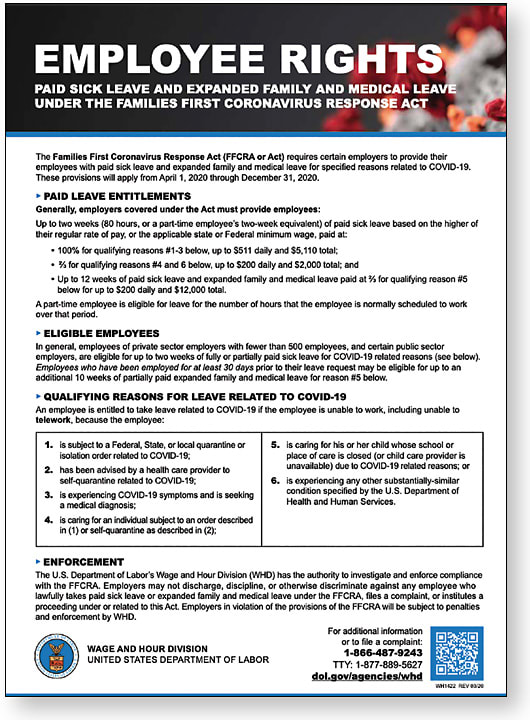To say that COVID-19 has been challenging to patient care would be an understatement. Another challenge the pandemic has posed: the Families First Coronavirus Response Act (FFCRA).
Below, I provide an overview of the FFCRA and answer questions related to the common regulations applicable to most employers. (This is not an exhaustive list.)*

OVERVIEW OF THE FFCRA
The FFCRA is a set of guidelines and rules regarding employee leave and pay. It is comprised of “The Emergency Paid Sick Leave Act” (EPSLA) and “The Emergency Family and Medical Leave Expansion Act” (EFMLEA) (bit.ly/33jCLb4 ).
The EPSLA provides eligible employees up to two weeks of paid sick leave and is applicable to new hires. An eligible employee is one who is employed full time, or normally scheduled to work 40 hours per week.
The EFMLEA provides eligible employees up to 12 weeks of family and medical leave, with 10 of these weeks paid. This Act requires a minimum of 30-day employment prior to taking this leave.
Both Acts set out specific COVID-19-related reasons allowing employees to take leave.
QUESTIONS RELATED TO COMMON REGULATIONS
Q: “Does the FFCRA apply to me?”
A: The FFCRA applies to employers who have less than 500 employees. However, there are exceptions. For example, employers who have less than 50 employees may be exempt from the requirements to provide paid leave, due to school closings or lack of childcare if the leave payment would “jeopardize the viability of the business as a going concern.”
Q: “Can my employee work remotely if they are taking leave under the FFCRA?”
A: If you allow it, an employee can work remotely. You are responsible for paying them their normal wages. They are not entitled to paid benefits under the FFCRA, unless they are unable to work the required hours, due to covered COVID-19 reasons.
Q: “If my employee takes paid leave under the EPSLA, are they still entitled to paid sick leave under local and state laws or my policy?”
A: Yes, they are still entitled to paid sick leave provided by your employee policies or other laws.
Q: “Are there any tax credits to help employers cover the cost of FFCRA?”
A: Yes, if you provide paid sick leave of expanded family and medical leave under FFCRA, then you are eligible for reimbursement through refundable tax credits. However, if you are going to claim this credit, you must have the correct documentation required by the IRS (see bit.ly/3kciPxg ).
Q: “Am I required to post a notice of employee’s rights under FFCRA?”
A: Yes. The Department of Labor requires employers to display the new poster in a conspicuous place on its premises. You can also satisfy this requirement by emailing or direct mailing the notice to employees. (See the following website for other questions regarding the posting requirement dol.gov/agencies/whd/pandemic/ffcra-poster-questions .) OM
*Again, this is not an exhaustive list, so I encourage O.D.s to speak with advisors to understand how these regulations may apply to the specific situation. Also, if O.D.s aren’t currently using a professional employer organization (PEO), now may be the time to consider it. These regulations are constantly changing, making it difficult for small businesses to keep up to date. PEOs can be a valuable resource.
Disclaimer: The information in this article is provided for general informational purposes only, and may not reflect the current law in your jurisdiction. The information contained in this article is not legal advice, and it is not intended to be a substitute for legal counsel on any subject matter. No reader of this article should act or refrain from acting on the basis of any information included in, or accessible through, this article without seeking the appropriate legal or other professional advice on the particular facts and circumstances at issue from a lawyer licensed in the recipient’s state, country or other appropriate licensing jurisdiction.




